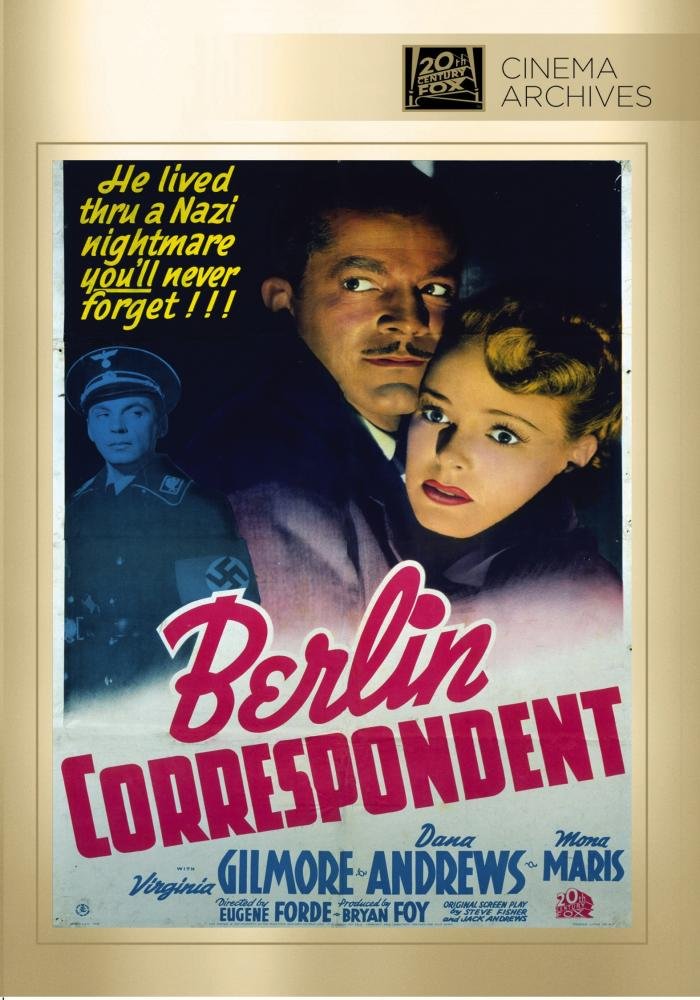
For many B-movie lovers like myself, the late great German-born Martin Kosleck will perhaps be best remembered as the mad scientist who helped create the titular creations in one of the earliest gore flicks, The Flesh Eaters in 1964 – and as a baddie in the ultra-campy no-budget American James Bond rip-off Agent for H.A.R.M. in ’66. Decades prior, however, Kosleck made a career playing villainous Nazis (including Herr Goebbels himself – four different times!) in World War II-themed motion pictures boasting both large and small budgets alike. His frequency inhabiting such roles was not just another case of prime Hollywood typecasting at its finest, though: Kosleck detested Hitler and the Nazi Party – and he put as much evil as he could into each part in order to help the war effort by portraying the Nazis as the immoral bastards they really were.
For 1942’s Berlin Correspondent, Kosleck found himself cast as the main villain in a tale of American newscaster Bill Roberts (Dana Andrews) stationed in Berlin as a guest of the country. Of course, the Nazis aren’t too terribly keen on Bill telling the world the truth about anything, so they ensure Mr. Roberts only reports what they want him to report. But Bill has his own agenda in mind – and has been secretly encoding his transcripts with secret messages only his newspaper buddies back in New York can translate. Unfortunately, the same buddies are the ones printing Bill’s surreptitious messages, which alerts the Nazis to his scheme, though they are unable to figure out just how he does it, or who his contact for information is.
So, the sinister Nazi Colonel von Rau (Kosleck) – fed up with the incompetence of both private investigators as well as Gestapo agents – decides to send in his own girlfriend (the stunning Virginia Gilmore) to find out the hows and whos. Sadly, her triumph for such a task reveals her own father (Erwin Kalser) as the man who is selling Roberts with his info! Naturally, because von Rau is such a bad, bad guy, he commits his future father-in-law to an insane asylum where he is to be “looked after” (executed – in a completely legal sense, of course). Realizing she has been aiding the wrong party, our heroine tries to compel the American reporter she condemned as well to help her and her father.
Though the tone of the film is decidedly lighter than most people’s suspension of disbelief will descend to (note the surprisingly roomy concentration camp and complete lack of Germany’s entire armed forces), Berlin Correspondent remains a nifty l’il WWII espionage B-flick. Andrews submits a fine performance, as does his lovely female counterpart, but it’s really the fourth-billed Kosleck that makes it so enjoyable. He’s a complete badass as always here, but with a weakness for she-who-he-mistakenly-presumes-to-be-his-girl – which doesn’t go over well with his personal secretary (Mona Maris) who has an extremely serious crush on him. Another highlight of the film is the sanitarium sequence (which is played for laughs for the most part), which features the one and only Sig Ruman – a frequent foil for the Marx Brothers – as the head of the clinic. The familiar faces of character actors Hans Schumm, Kurt Katch, and William Edmunds can also be seen in fairly pivotal roles. Eugene Forde (who usually helmed mysteries) directs a story co-written by Steve (Destination Tokyo) Fisher.
Previously only available via shoddy copies of dubious quality, Twentieth Century Fox brings us a bona fide release of Berlin Correspondent via their line of Manufactured-on-Demand DVD-Rs, the Fox Cinema Archives. The film is presented in a 1.33:1 aspect ratio and with a very clear and relatively clean transfer and a very audible mono English soundtrack (fortunately, everyone in Nazi Germany speaks English is this film – and quite well, at that!). The disc is a barebones affair, but fans of either Andrews, Kosleck, or even Ruman won’t mind having the opportunity to see this forgotten low-budget gem with an improved presentation.
Recommended.